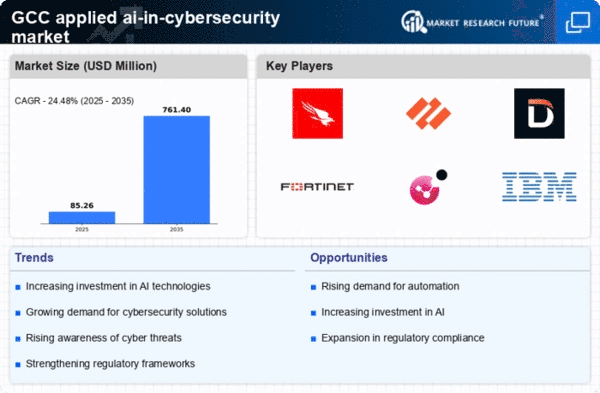Rising Cyber Threat Landscape
The increasing sophistication of cyber threats in the GCC region is a primary driver for the applied ai-in-cybersecurity market. As organizations face a surge in cyberattacks, including ransomware and phishing, the demand for advanced security solutions is escalating. Reports indicate that cybercrime costs in the GCC could reach $1.5 billion by 2025, prompting businesses to invest in AI-driven cybersecurity measures. This trend highlights the necessity for proactive threat detection and response capabilities, which AI technologies can provide. Consequently, organizations are increasingly adopting AI solutions to enhance their security posture, thereby driving growth in the applied ai-in-cybersecurity market.
Government Initiatives and Funding
Government initiatives aimed at bolstering cybersecurity infrastructure in the GCC are significantly influencing the applied ai-in-cybersecurity market. Various governments are allocating substantial budgets to enhance national cybersecurity frameworks, with investments projected to exceed $2 billion by 2026. These initiatives often include funding for research and development in AI technologies, fostering innovation in cybersecurity solutions. Additionally, public-private partnerships are emerging, encouraging collaboration between government entities and tech companies. This supportive environment is likely to accelerate the adoption of AI-driven cybersecurity solutions, thereby propelling the growth of the applied ai-in-cybersecurity market.
Demand for Automated Security Solutions
The growing demand for automated security solutions is significantly impacting the applied ai-in-cybersecurity market. Organizations are seeking to streamline their security operations and reduce the burden on human resources. Automation powered by AI can enhance efficiency, allowing for quicker threat detection and response times. In the GCC, businesses are increasingly adopting automated solutions to manage the complexities of cybersecurity, with a projected market growth of 25% in automated AI-driven security tools by 2026. This trend reflects a broader shift towards leveraging technology to address security challenges, thereby driving the applied ai-in-cybersecurity market forward.
Growing Awareness of Cybersecurity Risks
There is a notable increase in awareness regarding cybersecurity risks among businesses in the GCC, which is driving the applied ai-in-cybersecurity market. Organizations are recognizing the potential financial and reputational damage that cyber incidents can inflict. As a result, many are prioritizing cybersecurity investments, with a reported 40% increase in budgets allocated to security measures in 2025. This heightened awareness is leading to a greater demand for AI-based solutions that can provide real-time threat analysis and automated responses. Consequently, the applied ai-in-cybersecurity market is experiencing robust growth as companies seek to mitigate risks through advanced technologies.
Integration of AI with Existing Security Systems
The integration of AI technologies with existing cybersecurity systems is emerging as a crucial driver for the applied ai-in-cybersecurity market. Organizations in the GCC are increasingly looking to enhance their current security frameworks by incorporating AI capabilities. This integration allows for improved threat detection, incident response, and overall security management. As businesses strive for a more comprehensive security posture, the demand for AI-enhanced solutions is expected to rise. Reports suggest that the market for integrated AI cybersecurity solutions could grow by 30% annually, indicating a strong trend towards the adoption of AI technologies in existing security infrastructures.
















